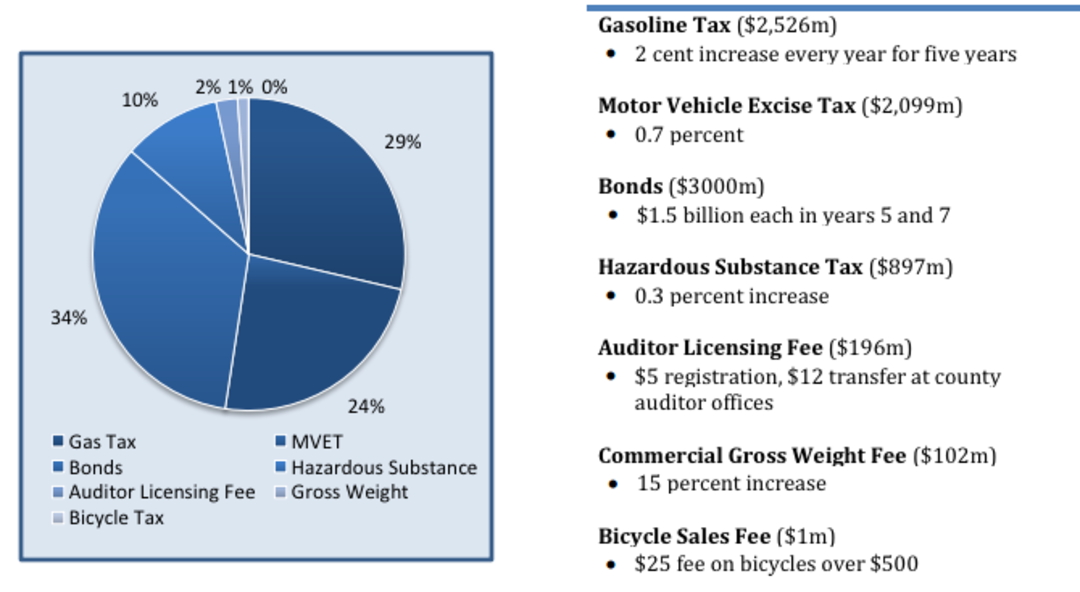House Transportation Leaders Propose $10 Billion Funding Package

State house transportation leaders introduced a transportation funding package down in Olympia this afternoon that includes a new 10-cent gas tax, a 0.3-percent increase in the hazardous substance tax, a new motor-vehicle excise tax ... and a $25 fee on bicycle sales.
The proposed legislation would pay for:
• $3.9 billion in new projects, including expansion of I-405; partial funding of the controversial Columbia River Crossing bridge between Vancouver and Portland; and new connections between SR-167 and SR-509 to I-5, with the goal of improving freight and manufacturing access to the Port of Tacoma;
• $2.2 billion in upgrades to existing transportation infrastructure, including new money for the state patrol, the state ferry system, and local transit agencies;
• $631 million for road and bridge maintenance and upkeep;
• $897 million for stormwater cleanup;
• $61 million for safety improvements for cyclists and pedestrians; and
• $675 million for local transportation and infrastructure improvements.
The money to pay for all those projects would come from a new 10-cent gas tax, implemented over five years; a new 0.7 percent motor-vehicle excise tax; $3 billion in bonds; a 0.3 percent increase in the state hazardous substance tax; a new fee on county auditor registrations; a 15 percent increase in the gross weight fee on commercial shipping; and a $25 fee on bike sales over $500.
"Everyone has a reason to think they're getting something out of this package," house transportation chair Judy Clibborn said this afternoon.
"What I often hear is that the bicyclists are not paying their way and they’re always asking for something, so I put it in there to see what the response would be."–State House Transportation Chair Judy Clibborn
However, the package released today leaves the ultimate distribution of funds between roads and transit unclear, and Transportation Choices Coalition director Rob Johnson—one of a group of labor, environmental, and business leaders gathered behind Clibborn to show their support for the agreement—said, "For us as an organization that works a lot on transit, bike, and pedestrian solutions ... we think this package is a good start." But, he added, he would like to see "a little more balance" in the final package.
That's likely to be an uphill battle. Clibborn noted that the proposal has to pass in both the house and the senate, where "we have bipartisan interest"—but not necessarily bipartisan support. And, Clibborn added, until the state supreme court rules on the two-thirds vote requirement for the legislature to raise taxes, it remains unclear "whether it's a 50-percent majority or a two-thirds majority."
More important, perhaps, to transit advocates, the package would give counties new local transit funding authority, including: a potential 0.7 percent motor vehicle excise tax in Snohomish and King Counties; an increase in county vehicle license fee authority, from $20 to $40; the authority for counties to put a gas tax of one, two, or three cents a gallon on the ballot; and the authority for counties where certain areas don't support transit to carve off areas that do as special transit taxing districts.
Notably missing from the list of revenue sources: A tax on vehicle miles traveled or new tolls, two revenue sources that won't decline as gas consumption goes down. Although people are driving less, which decreases gas-tax revenues, a bigger factor in declining gas taxes is the fact that cars are getting more fuel-efficient, a trend that isn't likely to reverse. VMT and tolls are more sustainable, but they're also more controversial, because they're viewed as penalties for driving. Hence, Clibborn's support for the gas tax, which she said people are unlikely to notice much given the huge fluctuations in gas prices drivers already experience from week to week.
Asked why she felt the need for such a substantial tax on bike sales (an effective five percent additional sales tax on a $500 bike), especially one that raises so little ($1 million of a $10 billion package), Clibborn said, "What I often hear is that the bicyclists are not paying their way (false: About half of road costs are paid for by general taxes paid by everyone, including cyclists—most of whom are also drivers anyway–Eds.) and they’re always asking for something, so I put it in there to see what the response would be."
The Cascade Bicycle Club responded to the proposal this afternoon, saying in a statement, "the package is still a long way from meeting our state’s diverse and most critical transportation priorities. ... The package’s proposed bike excise tax ($25 on sales of bikes costing more than $500) would harm hard-working small business owners."
Finally, Clibborn defended the inclusion of an increase in the hazardous substance tax, which supports stormwater cleanup and culvert replacements for fish passage, and which oil companies oppose. "Oh, I love to battle oil," Clibborn joked adding: "They’re not happy, it won’t be popular, and it will be fought.
"Remember, this has to go to the senate. We can love it to death over here, but it still has to make it through the other body."




